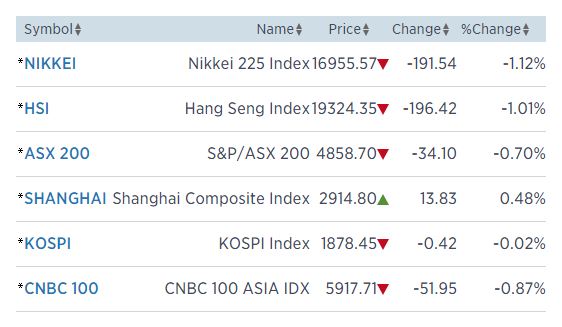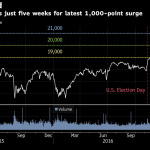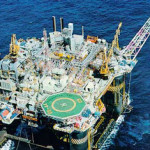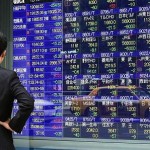Asia markets close mostly down; Japan, Australia near bear markets
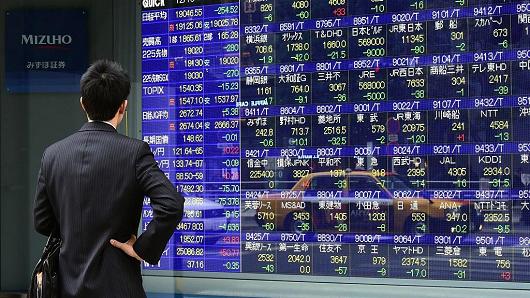
Markets in Asia closed mostly lower Monday, on the back of another Wall Street sell-off Friday. Major indexes in Australia and Japan were nearing bear market territory, down over 18 percent from their 52-week highs.
Down Under, the Australian market finished the session in the red, with the main ASX 200 index closing down 34.10 points, or 0.70 percent, at 4,858.70, nearing bear market territory after falling 18.78 percent from its 52-week high of 5,982.69 set April 2015. Earlier, the index traded off as much as 1.80 percent. Energy sector weighed heavily on the index, down 3.36 percent.
In Japan, the Nikkei 225 retraced some of its early losses to close down 191.54 points, or 1.12 percent, at 16,955.57 after falling as much as 2.39 percent earlier in the session. The index is off 18.74 percent from its 52-week high of 20,868.03 set June 2015.
South Korea’s Kospi closed flat at 1,878.45, after initially slipping as much as 1.19 percent at market open.
Chinese markets wavered between gains and losses in a volatile session. The Shanghai composite was trading up 0.94 percent after falling as much as 1.84 percent earlier in the session.
The Shenzhen composite was up 3.02 percent after opening down 2 percent and the CSI300 index traded 1.26 percent higher. Hong Kong’sHang Seng Index was down 0.9 percent.
Elsewhere, Taiwan’s Taiex closed up 49.17 points, or 0.63 percent, at 7,811.18, following an election over the weekend where the independence-leaning Democratic Progressive party (DPP) won a convincing victory in both presidential and parliamentary elections.
China data-deluge expected this week
With China set to release its fourth-quarter gross domestic product (GDP) numbers for 2015 on Tuesday, some analysts believe the recent rout in Chinese equities may worsen. China will also be releasing a slew of economic data Tuesday, including industrial production, fixed asset investment and retail sales.
Vishnu Varathan from Mizuho Bank said in a morning note, that if China misses its full-year economic growth guidance of 7 percent, which is widely expected, it will be “an excuse to sell.”
He added that with China equities down 9 percent last week and a “devastating” 18-22 percent for the year, there’s an “asymmetric” risk the GDP data Tuesday could spur “half empty tendencies” that could extend the China, and wider emerging market and commodity sell-off.
Tim Condon from ING said in a separate note that given the risk and uncertainties surrounding China, “any downside miss poses significant risk to financial markets.”
Earlier, the National Bureau of Statistics released the December new home prices, which rose 7.7 percent on-year, up from November’s 6.5 percent increase. Shanghai and Shenzhen-listed property stocks were mostly up, with Lvjing up 3.31 percent, Gemdale up 3.54 percent,Shanghai Shi Mao gaining 1.87 percent and Poly Real Estate seeing gains of 0.58 percent.
Before market open, the People’s Bank of China (PBOC) fixed its dollar-yuan mid-point at 6.5590, signaling a stronger yuan compared with Friday’s fix of 6.5637.
Oil futures retrace some losses
Major energy stocks in Australia sold off, with Santos tumbling 8.36 percent, Oil Search falling 5.06 percent and Woodside Petroleumsliding 2.59 percent by the market close.
Oil futures extended losses during Asian trade. The West Texas Intermediate (WTI) was down 2.01 percent at $28.83 a barrel, after falling to a session low of $28.36 earlier. Last week, it declined 6.33 percent. Globally traded Brent futures traded down 2.49 percent at $28.23 a barrel, after reaching a session low of $27.67 in the morning. Last week, Brent futures shed 8.27 percent.
Other energy plays across the region also saw red, with Japan’s Inpexlosing 1.45 percent and Japan Petroleum sliding 2.05 percent. South Korean oil plays such as S-Oil, SK Innovation and GS Holdings closed mixed, between down 0.94 and up 0.38 percent.
In China, Hong Kong-listed shares of CNOOC, PetroChina and Sinopecwere mixed, between down 3.40 and up 1.24 percent.
Concerns about increased output in an already oversupplied oil market were heightened after sanctions on Iran were lifted at the weekend.
Iran’s deputy oil minister said the country was ready to increase its crude oil exports by 500,000 barrels a day.
There’s another front opening in worries over commodity prices. Taimur Baig, chief economist for Asia at Deutsche Bank, told CNBC’s “Street Signs Asia” that another growing area of concern was the falling Baltic Dry Freight rates. The main Baltic Dry Index, which measures the cost of shipping dry bulk cargoes, including iron ore, cement and coal among others, fell 10 points, or 2.61 percent, to a record low at 373 points last Friday.
“As far as dry goods are concerned, there’s this massive overcapacity and too much inventory around the world. And demand for that is falling,” said Baig. “We saw this happen in 2008 and although in terms of movement of oil, in container ships, those numbers are not that alarming. But the dry freight one is particularly worrisome.”
Resource producers take a hit
Resources and financial stocks in Australia closed mostly down. Shares of Rio Tinto and BHP Billiton, the country’s two biggest miners, slid 2.08 and 2.92 percent respectively. Iron ore producer Fortescue erased losses to finish up 1.30 percent.
Among the country’s so-called four biggest banks, ANZ performed the weakest, losing 2.01 percent. The rest of the banks also closed in negative territory.
Some gold stocks finished positively, with shares of Newcrest up 0.94 percent. But Alacer Gold slid 4.84 percent amid price target cuts for the miner from the likes of Morgan Stanley, Credit Suisse and Macquarie, according to reports.
The Australian dollar retraced losses to gain 0.23 percent by mid-morning against the U.S. dollar, fetching $0.6916, after falling to its lowest since April 2009 in early morning trade.
Societe Generale (SocGen) said in a note Sunday that depreciation of commodity currencies mean, “production costs (a significant share is in local currencies) decline in dollar terms, further encouraging production [of commodities] and adding to the oversupply.”
The note added, “Weaker currencies spread concerns to other sectors indebted in dollars. These concerns then spill over to broader markets, further weighing on confidence in the real economy.”
The “concern is that the current configuration is leading to an investment drought that will trigger future shortages and price spikes,” SocGen said.
In Australia, index heavyweights Woolsworth and Wesfarmers finished up 4.37 and 2.03 percent. Retail giant Woolsworth said it would exit the Masters Home Improvement and Home Timber & Hardware business by either shutting it down or selling it. It was considered unprofitable. Wesfarmers, on the other hand, announced last week it would expand its hardware business with the purchase of U.K.-based retailer Homebase.
Japanese, Korea heavyweights retrace some losses
Japanese stocks extended their sell-off with major export stocks slipping as the Japanese yen, considered a safe-haven currency, was in demand as risk aversion grew. The dollar-yen pair climbed above the 117-mark to trade at 117.09, after previously slipping to a session low of 116.55. A stronger yen is usually considered negative for Japan’s exporters as it trims earnings when translated back into the home currency.
Export-oriented stocks such as Toyota, Nissan and Sharp finished in the red, down between 0.25 and 1.60 percent, after trading mixed in the afternoon session. Earlier, the stocks slid between 2 and 4.8 percent.
Index heavyweight Fast Retailing closed down 0.73 percent.
Shares of Toshiba saw gains Monday, with its shares finishing up 2.45 percent after news that Fujifilm plans to bid for the struggling electronics manufacturer’s fully owned medical equipment unit, Toshiba Medical Systems. Reports said Hitachi, Canon and Sony are also among interested parties eyeing the business unit.
In South Korea, blue chip stocks retraced losses to trade mixed, with shares of Samsung Electronics closed down 0.53 percent, after initially shedding 2.56 percent, Hyundai Motor retraced losses to finish up 0.36 percent, after falling as much as 1.44 percent, and Posco was up 2.17 percent.
Sell-off on Wall Street
On Friday, the Dow Jones industrial average closed down 390.97 points, or 2.39 percent, at 15,988.08, losing 2.19 percent for the week. The S&P 500 was down 41.55 points, or 2.16 percent, at 1,880.29, falling 2.17 percent for the week.
The Nasdaq composite slid 126.59 points, or 2.74 percent, to 4,488.42. The index shed 3.34 percent for the week.
Source: CNBC – Asia markets close mostly down; Japan, Australia near bear markets









